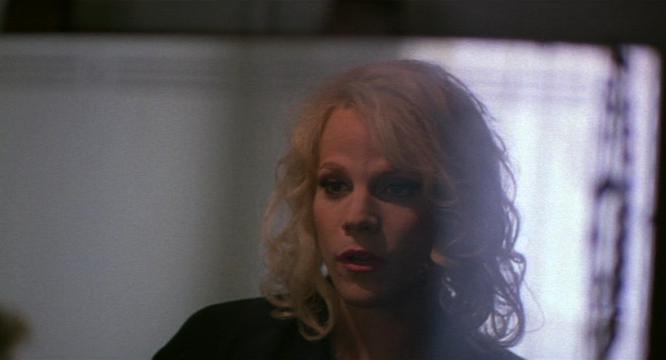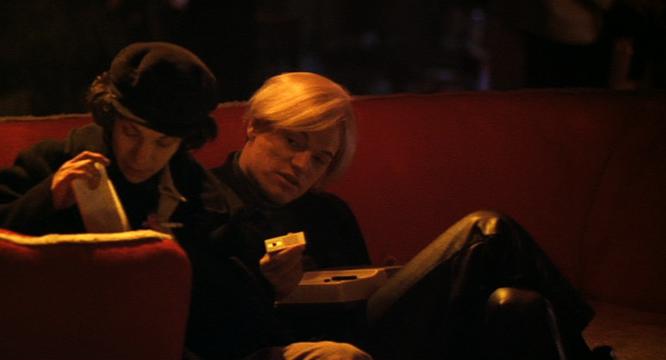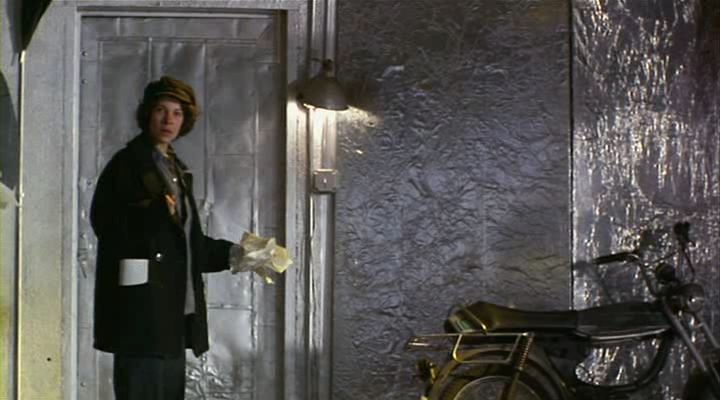 |
Um.... SPOILER!
|
So, who was Valerie Solanas? Attention-monger? Determined revolutionary (she did make a "Manifesto" after all in total squalor)? How about just a mixed-up broad... sorry, chick, babe, whatever us "Men" call women. She was certainly not one thing, which was stupid. And as well she wasn't full of shit either. This leaves off the last point on the George Carlin 'Some People Are..." meter:
fucking nuts. She had a bad childhood, the flirtation of a career in psychology on the horizon with a degree, and then a play called "Up Your Ass", which she tried to get produced in New York City by Andy Warhol's Factory. In the end, she put a slug in his torso, nearly killing him, and wound up in squalor after a stint in the loony bin. Her fifteen minutes, or, to quote the *other* Warhol line, another famous person made every fifteen minutes "made" by him. Fame, it seems, is not without a sense of irony.
 |
| Waaah, I was controlled by a fey man in a grey wig waah. |
Mary Harron's film is tough and fiery in its spirit. It captures the loose, too-cool-for-school attitude of the people at Warhol's clique-ish factory, which really looks more and more like a clique the more Valerie hangs around there. She's like a refugee from a John Cassavetes movie (it was hard for me not to think of Gena Rowlands pestering people on the street in
A Woman Under the Influence when Valerie does the same here, with that tough, blue-collar street-tough accent). And like a character in a Cassavetes movie we almost take it for granted, at first, that she's a little crazy. Valerie's on the fringes by an entirely existential reason: she could have a regular life and job and career. Fat chance of that. Work for the man - shit, *a* man? She'll go down on them, or screw them for money, but connect with one? Better yet are the drag queens, whom she can somewhat relate to.
 |
| Yes, that's Stephen Dorff. Now move along. |
The movie charts with a growing sense of agonizing dread that she won't get her work published - that is since she can't get her Euro-trash publisher's seemingly questionable contract out of her head - and that Warhol, who a) doesn't know how to put on a play and b) takes the advice of one of his 'factory girls' and decides not to go with it. Warhol is a fascinating cat almost by his lack of character, a decided move (like the drag queen, he is "playing" a character almost all the time, Andy Warhol created by Andrew Warhola), and by being one of the ultimate passive-aggressives (more so former than latter). He's played with an icy precision and detachment by Jared Harris. He gets that this guy has an innocence to him, somewhere, but it's hidden behind an also too-cool-for-school put-on. But hey, it's the 60's. What can you do except, you know, make soup cans and try and be a Superstar and drag all of the hanger-ons with you, good and bad.
 |
| "Oh, wow, that's so amazing. I'l just leech off you like a fungus until I'm through and need another wig." |
Valerie, on the other hand, is such a curious, strange person because of how frank she is, and how troubling she becomes. We want to feel sympathy for her, in some great part due to Lili Taylor's portrayal of her fractured mental state. She might be drawn to being a 'Superstar' like Warhol would want, except that she doesn't fit into the mold of the usual "Superstar" that others in the Factory would want as she's not beautiful or a junkie or whatever. And she doesn't fit in with the other revolutionaries, or rather doesn't tap into it; there's a painful if somewhat funny scene where she sees on TV a bunch of feminist protesters burning their bras and using sheep for symbolism. "Why aren't I there, why am I not on TV?" she asks. She finds this out the hard way when she does get on it, first by a trap she falls into by a snidely talk-show host, and secondly when she gets her fifteen minutes from shooting Warhol.
The other position that Harron takes with Solanas, one that had me respect the film very much, was not giving an easy point of view with her protagonist's worldview. What she says about female repression by men, and how they've fucked up everything that's come about in the world, is not wrong, and that women have been put into a position for what seems like forever of expected roles, those that she thinks need to be broken. Harron is more than sympathetic to tenets of her feminist ideology. But she's also in way over her head, one step away (if not just) one of those bums on the street rambling on or, of course, panhandling, and Harron doesn't sugarcoat how messed up she really was. There comes a point right before the film enters its third act that Solanas could have things going more her way. The self-destructive edge, as happens to a lot of so-called or actual revolutionaries, gets in the way.

As a character study it really rocks, for lack of a better description, and as a feat of stylistic integrity its very solid as Harron naturally-cleverly mixes around realism with a fantastic sense of the Factory, of its decadence and overblown self-importance (that is she doesn't make it look it, her point of view reveals how shallow and stupid it could be as an overrated hang-out for The Pop Artist), and then with black and white images of Solanas giving her manifesto words to the camera. In a sense
I Shot Andy Warhol is the much darker and less satirical version of
The King of Comedy, where a nobody tries to reach out to a somebody, and it becomes a self-fulfilling prophecy.







Comments
Post a Comment